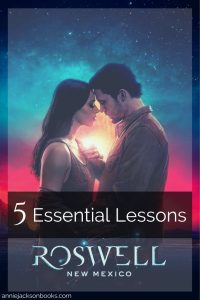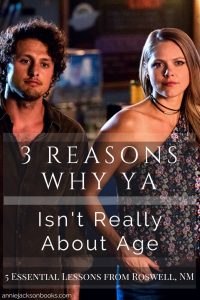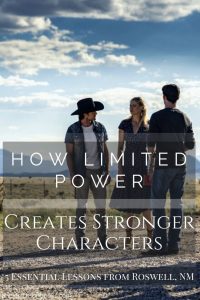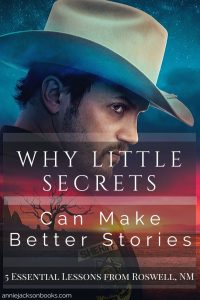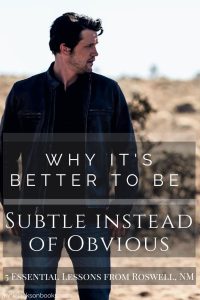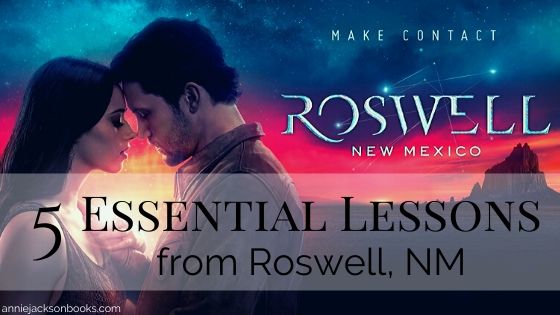The first three minutes of the original Roswell pilot are some of my favorite moments on tv, ever. One scene in BSG also makes the top 5 list, but this is about Roswell. That haunting Sarah McLachlan song, the urgency and intimacy of it all was absolutely captivating when it first aired and it’s never quite let go of me.
The same sequence in Roswell, New Mexico isn’t nearly as epic, as emotional or lingering. In fact, there isn’t a single moment in the new show that strikes you with the force of lightning and leaves its mark. That’s probably lesson the first – the power of incredible moments.
It’s not easy to conjure 5 lessons from 13 episodes but I think it’s incredibly interesting to have the original as a counterpoint in the discussion so let’s forge ahead.
YA Isn’t About Age
There’s this stigma that YA is not only written about teenage characters but also for teenage readers. If the characters are even slightly out of high school there’s some impulse to create a new pseudo-genre.
But if you study the history of the YA genre, it’s about the style and tone so much more than any age.
Roswell, New Mexico aged the characters 10 years which was an interesting move I was a bit skeptical of when I first read about it. But it’s still a CW show, not ABC or NBC and you can tell. It’s fun for these characters to be adults–to have the freedom and maturity that expands the story. Liz still makes a few inane assumptions but they lack the youthful naiveté of the first show because they’re tempered by proof and a refreshing need for facts and a fabulous ability to tell the truth.
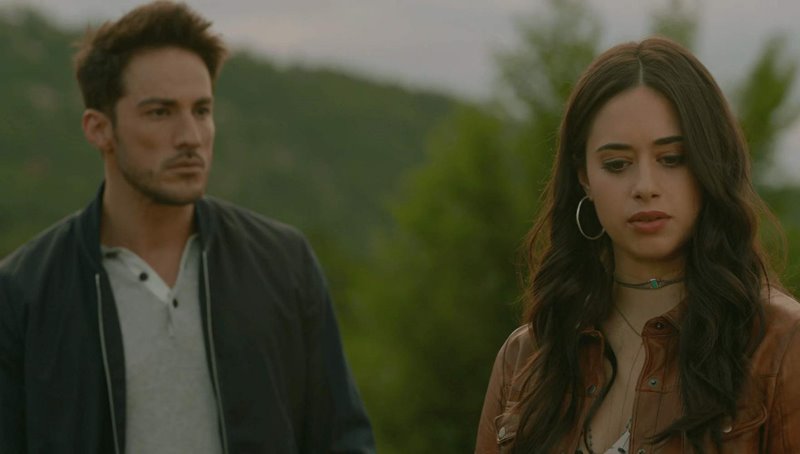
Adulthood also creates a different dynamic in the relationships between the characters. Kyle and Alex both fit into the narrative so much more smoothly. Because Kyle isn’t just the suspicious ex-boyfriend. His friendship with Liz is great and his not-quite rivalry with Max is so much more interesting. Alex isn’t just the sidekick friend, he has several dimensional relationships and his own role to play in the larger arc.
In fact, I like Kyle and Maria so much more than their previous incarnations. Kyle is smart and nice and a good friend and has practical, useful skills. And Maria is still the wacky friend but there’s a dignity to her and it makes her more fun.
Turns out, maturity suits the story well. But, again, this is a CW show. The style, the writing, and music is a CW show through and through (much like The Flash which is also a YA show about adult characters… ok young adults… which is kind of the point they start the story already out of college as literal young adults and not teenagers but I digress). It’s all brooding and lingering looks and intense almost moments but without the angst. It plays young and it has an immediacy and emotional vibrancy that’s very much young adult.
Roswell, New Mexico is a great example of a YA story with adult characters.
And you know what’s also fun? To see them age the characters down to teenagers for the flashbacks! They’re all fresh-faced and innocent and still themselves. It’s like all the years of making 30 year olds play teenagers totally has a purpose.
The Power of Little Secrets
I didn’t watch s1 of the original Roswell the first time around. I watched the pilot and a couple of episodes and got bored. And didn’t think of it again until I accidentally caught the finale. And I had all these questions–about the shifts in the relationships and who the new chickadee is and there’s these beautiful, powerful moments in the finale. So, over the summer I watched the reruns and caught up for s2.
I never had any intention of watching Roswell, New Mexico. I didn’t need to and I wasn’t that interested. But then it was on Netflix and I was curious how the pilot would compare to the original. The opening wasn’t as dynamic; the shooting not as epic, the characters decent enough. But there was that one bit between Max and Isobel about how Liz could never know. And I was mildly curious about that secret, especially in a show all about unveiling secrets.
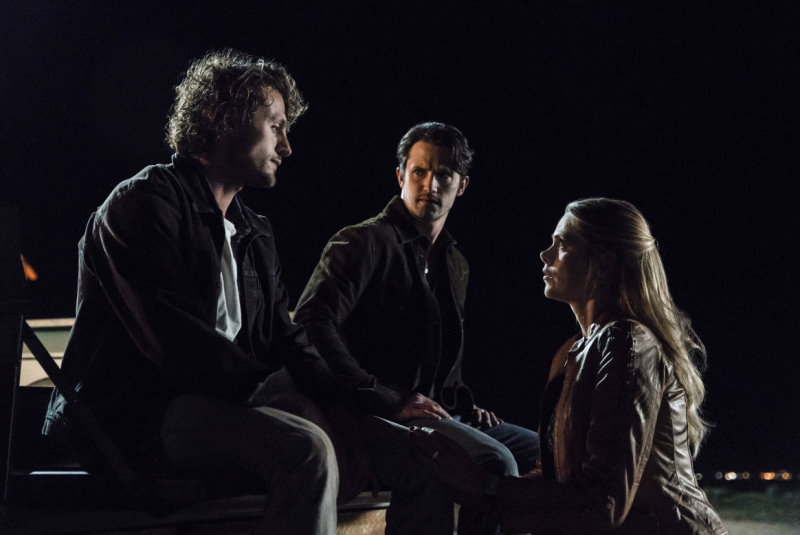
So, I watched the next episode out of curiosity. Which led to a new allusion to a different secret so I watched the 3rd episode. I was strung along for maybe 5 or 6 episodes before they finally explained everything. And by then, I was drawn in and watching for the characters rather than the secrets.
Which is the lesson for the day. Readers will follow a series for no other reason than that they like to spend time with the characters.
And if you need time to build out your characters, secrets are a great option to buy yourself that time. Especially small secrets that don’t dominate the plot. Questions about a character’s motivation; intriguing allusions to someone’s backstory; a glimpse of a hidden plan all make the reader want to know more.
The thing with secrets is not to draw them out so far the reader gets bored. The advantage of a 13 episode season is that Roswell, NM answered mysteries quickly. And then they created new ones. They cycled through over half a dozen mysteries in 13 episodes. In Harry Potter, Rowling answers all the questions in each book. Then she asks new questions in the next book.
The bottom line is, you don’t have to be writing a mystery to lace them into your story and add dimension to how you engage your readers.
The Beauty of Diversity
One thing Roswell, New Mexico is beautifully subtle about is diversity, in several different ways.
It’s oddly comforting that it was filmed in Albuquerque rather than the Paramount lot in LA. It’s refreshing to see Hispanic and indigenous people in a story set in the southwest. And a veteran carrying both psychological and physical disabilities from war.
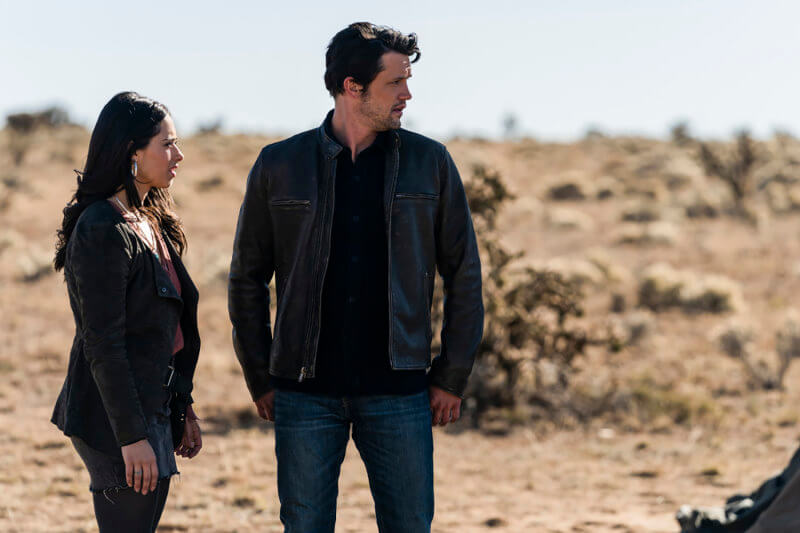
All of it creates a raw authenticity in the story. It feels honest and real, grounding you in the narrative without even having to try. That’s not so easy to manage in a novel, where you construct the world and characters in words rather than visually. But there are options you have that extend beyond basic physical descriptions.
- Different cultures have unique vernacular, particular idioms, nuances in their language you can leverage to establish your world.
- Character diversity can be established in something as simple as their name.
- You can also give them habits or traits that evoke their culture (like the way Liz mutters in Spanish when she’s frustrated).
In fantasy and sci-fi, it’s a choice to keep the cultural touchstones of the real world or to abandon them. Even if you’re creating a new world, the same methods can be used to evoke the culture of the story in the reader’s imagination and thereby create authenticity in even the most fantastic world.
The Advantage of Nuance
A lot of stories, especially in the sci-fi and fantasy genres, use their fantastical elements as metaphors for real world topics. It’s one of the advantages of the genres since taking it out of the real world context often diffuses the emotional tension. Except that Roswell, NM isn’t content with the metaphor and so layers the literal right on top of it.
It’s an understandable impulse, to have this need to make a statement and not trust in the subtlety of metaphor to accomplish that for you. The difficulty is, stories are more interesting and more engaging when they aren’t preaching to the audience.
Roswell, NM takes the alien aspect of the story and puts it in a real world context of immigration. Characters bring up the subject again and again with all the emotional heat and fervor of both sides. The writers completely ignore the inherent metaphor of the story in favor of the obvious and overt. It’s not a subtle exploration of tension and fear and prejudice. There is no subtext of outer space aliens and politic aliens.
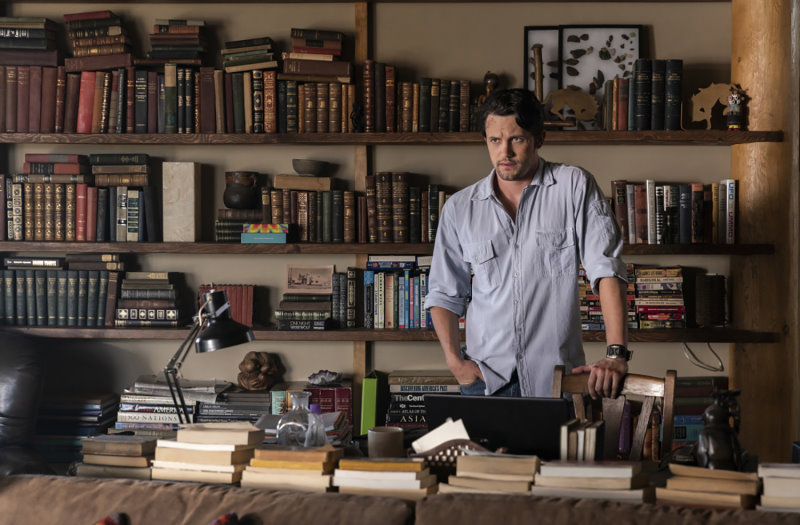
The thing is, when stories are about one thing on the surface but touch on real world issues underneath it literally gives them depth. Most of my favorite stories are about characters and their hearts and the things their wrestling with resonate with political, ethical and relational undertones.
I wish I could find the link to the Joss Whedon interview I read years ago where he talked about not putting overt messages into his stories and instead relying on the nuance of metaphors. He’s probably mentioned it in a dozen different interviews because he gets the subtly of a metaphoric story and uses it again and again. Buffy worked because he never said what vampirism was about. It could be alcoholism or addiction or general teen angst. The important thing was that the emotions were real, were relevant, and because it never declared what it was about, it was able to resonate in so many ways with so many people.
Limited Power and Characters
One of the things that always annoyed me about the original Roswell was how ubiquitous their powers were. I’m not someone who likes the cliché of ‘magic always comes with a price’ but your character’s power, whatever it is, shouldn’t be so convenient that there are no restrictions. Because that’s boring.
The aliens in the original Roswell each had their own specialties but basically any of them could do anything the story needed. It undermined that authenticity that Roswell, NM has.
But let’s take it beyond the basic lesson of limiting power to create conflict and avoid deus ex machina.
Putting limitations on power also helps define characters. Boxing the aliens into specialties changes their power from something generic to something that’s a part of them; that makes them distinct from each other; and also forces them to work together because they don’t just need each other, they need each other’s power.
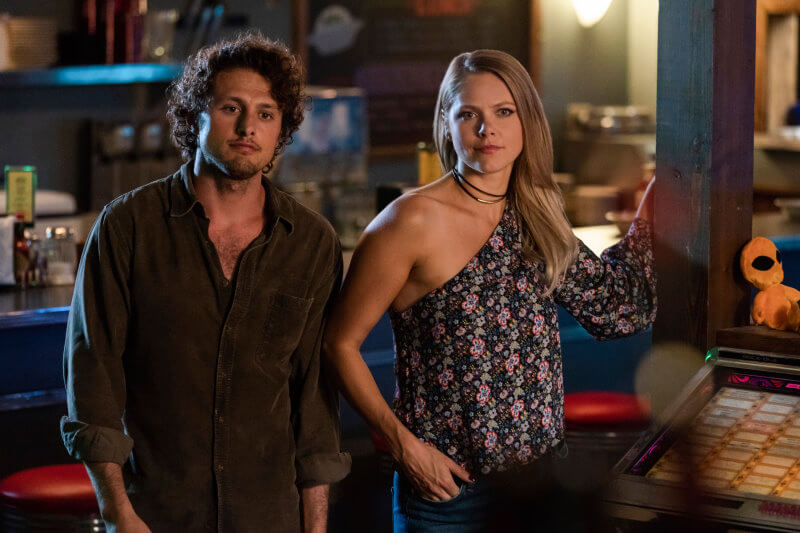
It would be especially interesting if the price for using their power is different for different characters (which I so rarely see in stories but has the potential to add even more unique character development).
I also like that the limitations are woven into the nature of their power – that healing costs so much because it’s not following the nature of the power. But destruction fuels them.
Bonus Lesson: Allusions in Retellings
I read a criticism that the Roswell, New Mexico ‘reboot hews too closely to its predecessor to transcend the pitfalls of a redundant retread.’ Which is ridiculous because I loved the allusions to the original series!
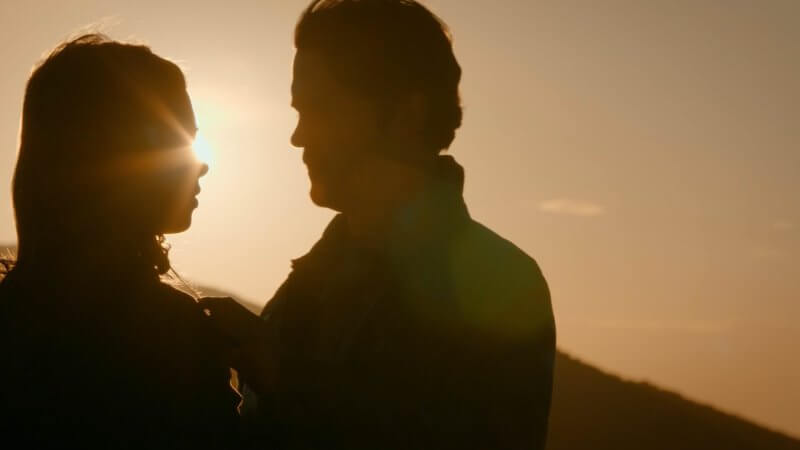
Granted, I haven’t read the books. So, I can’t define the line between when Roswell, New Mexico is following the books and where it follows the original show. But, as a fan of the original, those little moments and lines were fantastic, and in some ways, the smaller the better.
- Like Liz and Max looking at each other through the window at the Crashdown.
- When Max got shot, I thought “cool, now he needs Alex’s blood” which of course he didn’t but I like that he got hurt.
- And I like that Max drives a Jeep.
- When Michael and Maria are in Texas I’m thinking, ‘285 south – road trip!’
- The woman with Arizona had me thinking ‘she’s River Dog.’
- I liked that Cameron was like the Tess in the triangle and I liked her sooooo much better than Tess.
- And I liked that there’s a throwaway line about Tess liking Max at the prom.
- And the big moment with Max and Liz outside the cave that echoes the season 1 finale only this time she doesn’t walk away.
Those little moments made it familiar and new and fun. Which is really only a lesson if you’re writing a retelling. But if you are, allusions to previous version(s) make for fun inside moments with the audience. Notice of course that we’re talking about allusions and not outright copying–something subtle and fun and clever, even sometimes redoing a scene or a moment but bringing your own creativity to it and changing it so that it plays out the way you thought it should have all along. Yes, allusions evoke the other incarnations in the reader’s mind. They also highlight where you’re different.
If nothing else, it’s a fun game to play to see where you can lace them in.
